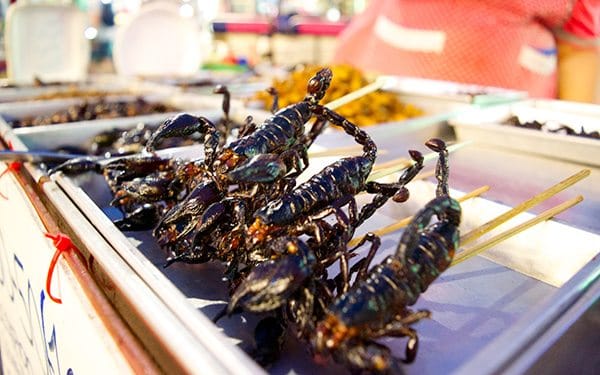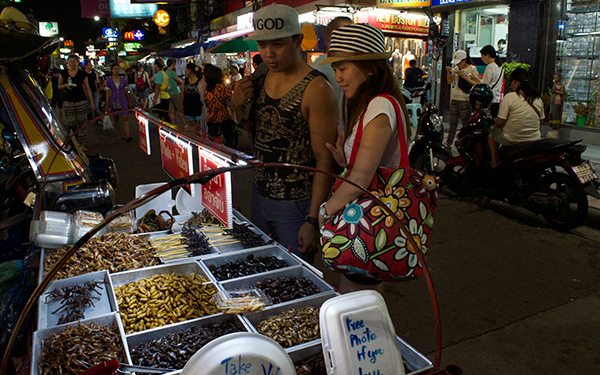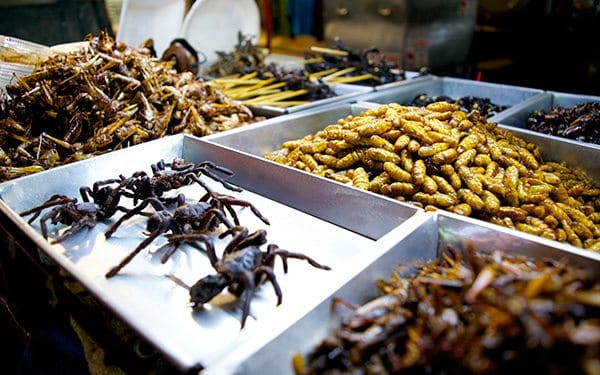Most backpackers who have made their way through Bangkok have stumbled down the infamous Khao San Road at some point during their travels.
Its charm, if you will, though oftentimes hard to pinpoint, lies in the inexpensive buckets filled with God knows what, the long stretch of road crawling with the comfort of foreigners — and the helium balloons aren’t half bad, either.
That being said, I am not here to talk about the road that has become a haven for backpackers… I want to talk about bugs.
Bangkok’s got bugs
I have eaten a scorpion (or two, or three …) during some drunken escapades on that Godforsaken road.
But while many of us ingest these bugs for the shock value or the sheer thrill of eating something so venomous, the selling of these bugs could be something short of ingenious, and the vendors don’t even know it.

Aside from the Khao San scorpions, you can find vendors throughout Bangkok selling everything from grasshoppers to silk larvae.
These fried insects, though ominous and intimidating from most perspectives, could be paving the way for the future of how we dine.
Some people have even come to the conclusion that eating insects could save the world.
Why you should eat insects
Arnold van Huis, a tropical entomologist at Wageningen University in the Netherlands, gave a Tedx Talk on 3 September 2012, attempting to convince the audience that they should be eating bugs. Why you ask?
- Insects have a similar amount of protein in them to traditional sources, such as eggs or beef.
- Harvesting insects requires significantly less food than rearing livestock.
- Rearing livestock emits a high amount of greenhouse gases (50 percent of all greenhouse gas emissions, to be exact).
- And, last but not least, there are about 1.4 billion insects per person, so there will seemingly be no shortages of sources of protein anytime soon. This is not the case for traditional sources of protein, however.
There is a perfect storm of different elements that are leading many to believe the world is simply going to run out of food.
According to a 2010 Time article titled, “Impending Crisis: Earth to Run Out of Food by 2050?”, scientists are warning politicians and world leaders that a famine is coming.
With the global population steadily growing, climate change occurring and water sources depleting, scientists just might be right about this. It’s becoming harder to keep the animals we so love to eat alive in the first place.
Van Huis isn’t the only one trying to convince people to eat insects, either. From Tedx Talks, to documentaries and articles upon articles flooding my Google search page, a lot of people seem to be getting behind this idea that people should swap out the three little pigs for a good helping of crickets.
I am a vegetarian, so my being pro-bug might seem like a huge contradiction.
But while I would not mind if everyone stopped eating meat (mind you, I am not some pushy vegetarian that shakes my forlorn head at everyone I dine with as they try to enjoy their cheeseburger), I do think changing out meat for insects is a good idea for many reasons other than the fact that the meat industry’s ethics are questionable, at best.
I don’t believe I would think differently even if I was some ravenous carnivore, either.
Sure, we would all miss enjoying our ten baht moo ping off the side of the road and the occasional steak. That being said, any human being who cares about, let’s say, their future generations, animals, the environment, planet Earth … you know, small things like these, might consider cutting meat out of their diet and switching to this creepy, crawly alternative instead.
Thailand for the win
Thailand is ahead of the game for a change.

According to a 2014 US News & World Report Travel article, Thailand is one of only nine countries that are listed to have jumped on the bug bandwagon. Other countries include Mexico, China and Ghana, where insects are actually referred to as a “means of survival,” especially during the spring months when Ghanaians are planting crops.
The US made this list too, but not because they are opening some groundbreaking restaurants with bugs on the menu.
No, insects in the US are eaten on television shows as part of competitions to win money, or they are seen in candy shops covered in garlic powder or chocolate. Edible insects are more-so a novelty, as opposed to an innovative protein alternative.
It is more cost effective to raise bugs as opposed to livestock, as well. This is important to note, because 10.9 percent of Thailand’s population is living below the poverty line, according to the Asian Development Bank.
All those opposed will please say nay
There are some who question whether eating bugs as a sustainable source of protein will ever become a reality.
According to a 2015 Time article, a new study that raised crickets on a number of different diets to better ascertain their nutritional benefits left researchers … disappointed.
For one, they really did not produce all that much protein. The crickets that produced the most protein were on the same diet as a chicken, and those crickets that were fed strictly food waste died before they could even be harvested.
So this has left eyebrows raised, but this does not necessarily kill the idea entirely. That study was on crickets alone, and they were given strict diets as opposed to seeing which combination of diets would work best to harvest them.

Whether it be hunger that drives you or the want for some good shock value, go ahead and reach for that scorpion or cricket or whatever insect it is you find yourself facing off with next time you see a Bangkok bug cart.
You could be saving the world, one bug at a time. And who knows, you might even find them to be pretty tasty.
All photos by Kelly Iverson


1 Comment
Pingback: The Best Halal Hotel In Bangkok (And 3 Other Great Ones) | WOS